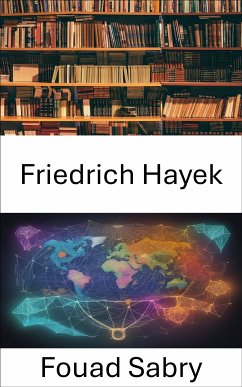Who is Friedrich Hayek
Friedrich August von Hayek was an Austrian-British economist and political philosopher who made contributions to a variety of subjects, including economics, political philosophy, psychology, intellectual history, and others. He is commonly referred to by his initials, F. A. Hayek. The Nobel Memorial Prize in Economic Sciences was awarded to Hayek and Gunnar Myrdal in 1974 for their respective contributions to the study of money and economic fluctuations, as well as the interconnection of economic, social, and institutional phenomena with one another. It is widely acknowledged that his explanation of how prices convey information is a significant addition to the field of economics, which is what led to him being awarded the recognition.
How you will benefit
(I) Insights about the following:
Chapter 1: Friedrich Hayek
Chapter 2: Austrian school of economics
Chapter 3: Milton Friedman
Chapter 4: Henry Hazlitt
Chapter 5: Frank Knight
Chapter 6: Libertarian theories of law
Chapter 7: Chicago school of economics
Chapter 8: Mont Pelerin Society
Chapter 9: The Road to Serfdom
Chapter 10: Armen Alchian
Chapter 11: Criticism of socialism
Chapter 12: Ludwig von Mises
Chapter 13: Friedrich Hayek bibliography
Chapter 14: The Use of Knowledge in Society
Chapter 15: Consequentialist libertarianism
Chapter 16: Individualism and Economic Order
Chapter 17: Perspectives on capitalism by school of thought
Chapter 18: Ronald Hamowy
Chapter 19: Norman P. Barry
Chapter 20: Alan O. Ebenstein
Chapter 21: Masters of the Universe (book)
Who this book is for
Professionals, undergraduate and graduate students, enthusiasts, hobbyists, and those who want to go beyond basic knowledge or information about Friedrich Hayek.
Friedrich August von Hayek was an Austrian-British economist and political philosopher who made contributions to a variety of subjects, including economics, political philosophy, psychology, intellectual history, and others. He is commonly referred to by his initials, F. A. Hayek. The Nobel Memorial Prize in Economic Sciences was awarded to Hayek and Gunnar Myrdal in 1974 for their respective contributions to the study of money and economic fluctuations, as well as the interconnection of economic, social, and institutional phenomena with one another. It is widely acknowledged that his explanation of how prices convey information is a significant addition to the field of economics, which is what led to him being awarded the recognition.
How you will benefit
(I) Insights about the following:
Chapter 1: Friedrich Hayek
Chapter 2: Austrian school of economics
Chapter 3: Milton Friedman
Chapter 4: Henry Hazlitt
Chapter 5: Frank Knight
Chapter 6: Libertarian theories of law
Chapter 7: Chicago school of economics
Chapter 8: Mont Pelerin Society
Chapter 9: The Road to Serfdom
Chapter 10: Armen Alchian
Chapter 11: Criticism of socialism
Chapter 12: Ludwig von Mises
Chapter 13: Friedrich Hayek bibliography
Chapter 14: The Use of Knowledge in Society
Chapter 15: Consequentialist libertarianism
Chapter 16: Individualism and Economic Order
Chapter 17: Perspectives on capitalism by school of thought
Chapter 18: Ronald Hamowy
Chapter 19: Norman P. Barry
Chapter 20: Alan O. Ebenstein
Chapter 21: Masters of the Universe (book)
Who this book is for
Professionals, undergraduate and graduate students, enthusiasts, hobbyists, and those who want to go beyond basic knowledge or information about Friedrich Hayek.
Dieser Download kann aus rechtlichen Gründen nur mit Rechnungsadresse in A, B, BG, CY, CZ, D, DK, EW, E, FIN, F, GR, H, IRL, I, LT, L, LR, M, NL, PL, P, R, S, SLO, SK ausgeliefert werden.


